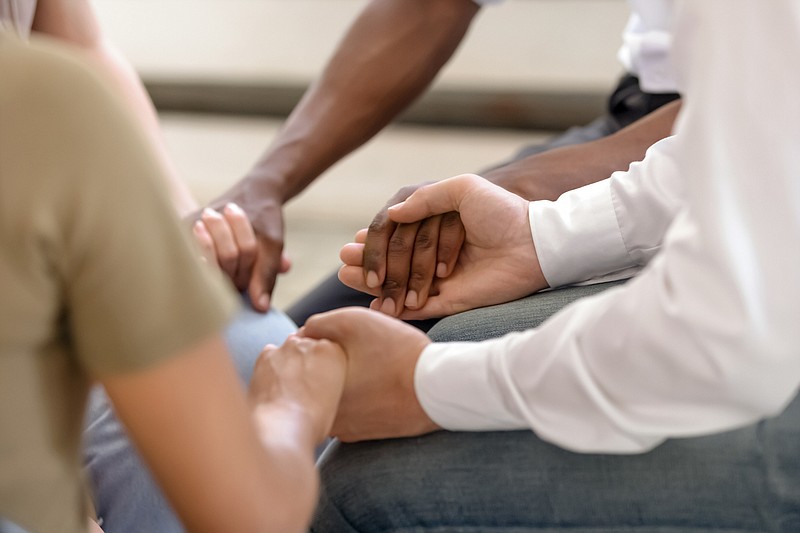On the day Tennessee Gov. Bill Lee declared state residents should join him in praying and fasting, people should not overthink the ways they can be more mindful in their daily lives, said Micki Ann Harris, spiritual formation director at the Chattanooga House of Prayer.
The House of Prayer is hosting a guided prayer gathering between noon and 1 p.m. on Thursday as part of the statewide day. Prayer is something anyone can do, no matter where they are, Harris said, suggesting people who are praying for the state work through spheres of influence, for example praying for families, then politicians, then law enforcement, then the environment.
"There is something really powerful about realizing when a day of prayer has been called, you are among many, many people who are doing the same thing that day," she said.
Lee regularly referred to his Christian faith during his campaign for governor in 2018. His state profile page says he is active in Grace Chapel Church, a non-denominational megachurch in Williamson County. While announcing the day of prayer in a video posted to his social media accounts, Lee said he was motivated to create the day after hearing from state residents who were praying for him.
More information
The Chattanooga House of Prayer is located at 3912 Dayton Blvd., Suite 200. The guided prayer session will be Thursday between noon and 1 p.m.
"Prayer strengthens our families and it strengthens our communities," Lee said in the video. "It strengthens our relationship with our neighbors, it strengthens our relationship with God himself."
The governor posted a proclamation for the day on his Twitter page on Friday. The announcement asked people to be thankful for the state and seek forgiveness for transgressions and injustice.
The guided session offered at the House of Prayer on Thursday will include a thankful recognition of things that are going well in the state, such as the economy and its natural wonders, as well as an acknowledgement of current problems, such as the 15% of state residents living below the poverty line. People should hold the good and the bad at the same time in their prayers, Harris said.
"In our relationships, if we were to meet up with people that we loved and we only talked about our needs or the things that we saw there were negative, that would not be really good for relationships," she said. "It's the same with our relationship with God. It's a personal relationship."
Prayer has long been an important part of America's identity, said James Moore Jr., founder and CEO of the Washington Institute and author of "Prayer in America: A Spiritual History of Our Nation." Even though the U.S. Constitution does not include vivid Christian language, the role of religion was present when America was formed, he said.
"The founding fathers were very much a God-fearing people," Moore said. "It was a pretty good thing to have individuals believing they weren't the highest power in the universe, but that they needed to answer to a higher power."
Politicians, at the local and federal level, have a long history of calling for times of prayer, Moore said, even as the country has ebbed and flowed in its relationship with religion.
More than half of Americans say they pray at least once a day, according to a 2015 study by the Pew Research Center. A separate 2016 study found that 29% of Americans who say they are not highly religious still turn to prayer or religious reflection when making life decisions. Among highly religious Americans, some 86% turn to prayer.
Overall, the United States is growing less religious, especially among younger generations, according to a 2015 Pew study. Around a third of adults say they seldom or never attend religious services.
Lee's proclamation includes three uses of the word "God," a reference to the Christian tradition, whereas Muslims would refer to "Allah" and Jews often write "G-d" in an act of respect.
The announcement has not been without controversy and pushback from members of the faith and atheist communities. The governor's day of prayer comes the day after Yom Kippur, the Jewish holy day of repentance and atonement and a time when Jews in the state will have fasted. Tradition bars Jews from fasting two days in a row.
Rebecca Markert, legal director at the Freedom from Religion Foundation, said in a September interview that the day could marginalize people who do not believe in God.
"Not only is it inappropriate for a governor to sort of exhort citizens to pray on a particular day, what's upsetting about this announcement that Oct. 10 is going to be a day of prayer and fasting is just how much he talked about the importance of prayer and how God hears prayers and answers them," Markert said.
Harris said the backlash does not focus on the greater good that can come from prayer. People should see the call similar to if the governor had asked for everyone to volunteer or pick up trash on Thursday, she said.
"It is the same kind of call," Harris said. "You're being asked to look out for the well-being of your city [and state] by praying for it."
From the reporter
I became a journalist to help people see people as people. But highlighting the human side of every policy decision, and how it is affecting your community, takes time as well as support from readers. If you believe in telling the stories of people in your community, please subscribe to the Times Free Press today. Contact me at wmassey@timesfreepress.com or 423-757-6249. Find me on Twitter at @News4Mass.
